Libya Telecoms and Broadband service expanding at steady pace amid considering new telecoms law
Libya Sector Analysis
Libya Telecoms and Broadband service expanding at steady pace amid considering new telecoms law
In post-rebellion Libya, the telecoms are up and working and more fiber optic linkages are being established to improve efficiency, but policy makers want to see the telecoms entities devolve from state ownership to private companies.
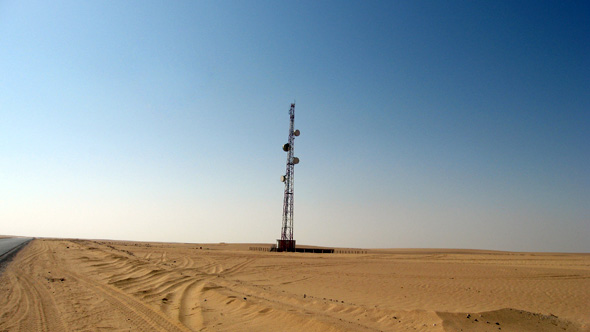
Libya Telecoms and Broadband service expanding at steady pace amid considering new telecoms law
By TK Maloy
TRIPOLI – In post-rebellion Libya, the telecoms are up and working and more fiber optic linkages are being established to improve efficiency, but policy makers want to see the telecoms entities devolve from state ownership to private companies.
With the overthrow of the Gaddafi regime, already a great change has taken place with a type of organic liberalization as the telecoms sector is free of the corruption and nepotism that was rampant during the old regime.
“We want to promote the private sector, we want to make sure that this telecom law is up to the international standards and we want to make sure there is an independent regulator because the monopoly from the previous regime was very strange and decisions were being made and licenses given all from the same place,” said Usama Siala, Minister of Communications and Informatics of Libya.
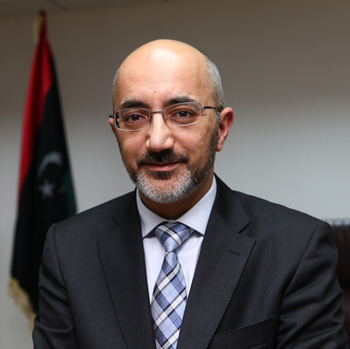
Currently the draft law is in the hands of the General National Congress, but the timetable for enactment is uncertain.
“Let’s say for example there is a lot of talk about establishing a third license for a third operator in Libya, well with the existing law we cannot do that,” Siala said.
So the status quo of Libya telecoms continues to be that of a monopoly arrangement under government ownership.
Once the new law is passed the minister wants to see a new “third operator” that will not just serve the country’s four main cities, but provide service throughout Libya.
“I want to secure the interests of the subscribers and the interests of the Libyan government, and at the same time I want it to be easy for the investor to feel secure about their investment here in Libya. This is what the telecom law is focusing on,” the telecoms minister said.
On the Internet front, social media in Libya played a large role in rebellion communications – between rebel-communities and to the outside world — Facebook, Twitter and YouTube brought much news of the revolution to the world audience. As in much of the Middle East, FB is a favorite medium for exchange information, making connections and acting as an instant commentating system on the news of the day.
Rated at 98th in the world for subscriptions to fixed broadband Internet service, there are an estimated 72,800 users, or 1.5 subscriptions per 100 inhabitants. Again these figures are from 2010.
“I want to secure the interests of the subscribers and the interests of the Libyan government, and at the same time I want it to be easy for the investor to feel secure about their investment here in Libya. This is what the telecom law is focusing on,” the telecoms minister said.
In an interview with Marcopolis, the CEO of LTT (Libya Telecom and Technology, the first and main Internet Service Provider (ISP) in Libya, started in 1997), Husam Abulhul said of the Internet sector: “We are focusing on the mass market; we have two main services here: WiMAX and ADSL. We are expanding these two services over the whole of Libya. We have almost 200,000 subscribers for WiMAX and almost 100,000 subscribers for ADSL. It is my target and the target of the Ministry of Communications to increase the number of internet subscribers in Libya by another 300,000 based on our network capacity. We are close to achieving 400,000 new subscribers, which will increase the internet penetration in the country from 5 percent to 15 percent, and this is our target.”
As to when further liberalisation will take place, the LTT had added, “Very soon, the Ministry of Communications has offered 22 new licenses. We are helping this ISP to provide the service by providing them with broadband units. So we will be the wholesale for these ISPs.”
Abulhul noted that the status quo in terms of pricing, “The price is acceptable to the customers. The price of ADSL is 20 Libyan dinars per month and the price of WiMAX is 30 Libyan dinars per month, which is acceptable with regard to the Libyan market.”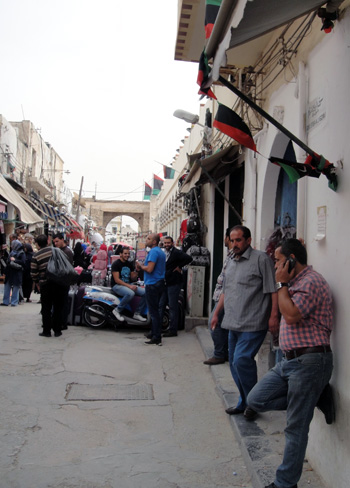
Despite having an old style state-owned monopoly for the country’s telecoms and Internet, Libya’s telecommunications infrastructure is superior to those in the majority of other African countries. Also, services are available at more affordable rates compared with elsewhere in the continent.
Libya has a fixed-line teledensity that is one of the highest in Africa, which was brought about through an extensive rollouts of CDMA-2000 wireless local loop technology during the Gaddafi regime in 2006. Initially the mobile sub-sector was underdeveloped with Al-Madar as the exclusive cell operator until the establishment of Libyana as a second GSM network in 2004. This sent mobile market penetration rocketing, going from being one of the lowest in Africa to one of the highest on the continent in the space of two years.
Libya became was the first country in Africa to reach 100 percent mobile penetration in 2008. While both mobile networks are state-owned enterprises (SOEs) they provide distinct and different service offerings. Also, the mobile companies are engaged in the Net and broadband sector with by providing mobile data services.
According to Salah Ibrahim Mokhtar, the CEO of Libyana, the company’s market share is between 72 percent and 73 percent of the total market in data and voice.
“The number of active subscribers that we have reached this year more than 4 million active subscribers, this never happened before not even before the revolution. There is the opportunity to add more sites and to increase the number of subscribers as we implement this new project, you will be amazed by the increase in subscribers especially in terms of data. Currently people cannot connect to the internet easily, especially outside of the main cities,” he said.
More the than US$1 billion worth of telecom infrastructure was destroyed during the rebellion, also including about 20 percent of Libya’s cell sites.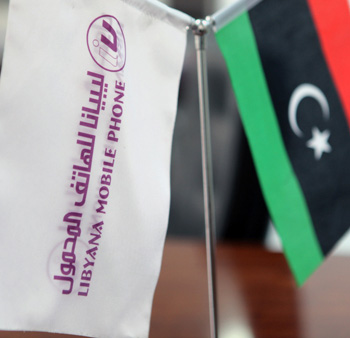
Assessing the post-rebellion service level of the telecoms, Siala said “If you look at them as separate networks, Almadar has recovered about 95 percent of its pre-war status, and Libyana has recovered about 97 percent. The only problems we are facing right now are from some very big towers that were destroyed and will take time to rebuild; also we have some theft occurring in some remote areas where people have been stealing some of our solar panels, but that is it, we are almost back on track.”
“In terms of the mobile operators: most of the infrastructure for the wire line is back, the fiber projects are back online, most of the government’s ISPs are also back on track, the only issue we face is coverage in some areas when it comes to the two mobile operators that we have,” the telecoms minister said.
Looking at the amount of investment that the government has put into improving service and infrastructure, Siala said that for Libyana the ministry estimates expenditures of around 230 to 250 million Libyan dinars, with a similar amount being spent to modernize Almadar.
“Before the war the network was fragmented, there were different vendors in different areas with no real logic or consideration of the country as a whole. We are going to modernize the whole network: core, billing, value added services, radio and transmission,” the minister said.
“When it comes to fiber, we are almost done, most of our projects are back on track, and some of them are 60 percent or 70 percent completed so there are no major contracts in fiber yet. 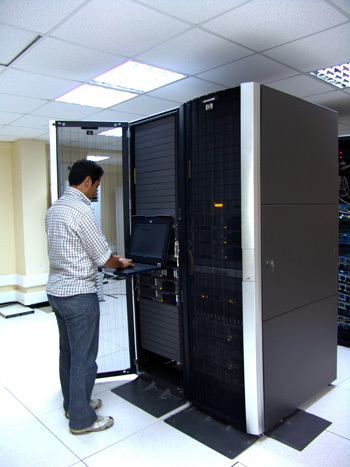 In the wire line we are going to start some pilots for FDT (Fiber Distribution Terminal) fiber to the home technology, we are going to invite three or four of the major vendors, give them certain areas and set them some KPIs (Key Performance Indicators) and if they reach these KPIs we will buy the service from them,” Siala said.
In the wire line we are going to start some pilots for FDT (Fiber Distribution Terminal) fiber to the home technology, we are going to invite three or four of the major vendors, give them certain areas and set them some KPIs (Key Performance Indicators) and if they reach these KPIs we will buy the service from them,” Siala said.
He added that based on the technology and the experience gained from this rollout of fiber to the home the government will start expanding this technology.
“This will be a huge project, just the civil work we expect to cost 1 billion Libyan dinars, to connect fiber to every single home. I do not expect this one billion Libyan dinars to be spent during this coming year or two; it will be spent over 5 years,” Siala said. “We cannot just go around putting fiber cables in everywhere, but wherever there is a new property development we will install them, or wherever there is a business project they will also be installed, thus we will prioritize our spending in this area.”
All this is adding increasing value to the telecoms sectors. On the valuation of the smaller of the two telecoms, general manager Abdulla A. Abouda said that during the last valuation, the company was valued at US $2 billion. Adding, “I am not sure about the current value. The company has grown so I believe it is worth more than US $2 billion now.”
Among the various deals that have been inked include a contract between government owner Libya International Telecommunications Company (LITC) and French manufacturer Alcatel. The amount of the contract has not been disclosed.
Also it was reported in May that TI Sparkle, a unit of Telecom Italia Group and Gateway, an alternative local operator in Libya, have signed a contract for providing international end-to-end services to and from Libya.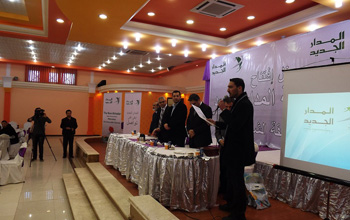
The two parties are now able to offer end-to-end international SDH and Ethernet services to and from Libya. It was also reported that Native MPLS solutions will be added to the portfolio at a second stage. Designed to cater to the demands of corporate clients, the services are offered through a joint platform created by a combination of Gateway’s recently constructed Libyan national backbone and of TI Sparkle’s existing international capacity.
“We are very happy of this new partnership that adds to relevant existing relations with Libyan operators, as corporate customers’ demand for international services with Libya continues to grow,” IT Sparkle CEO Elisabetta Ripa told Libya Business News.
In February, the Libyan Herald reported that Alwaidi Communications, a small Libyan company had beaten out international competition to win a US$4 million contract from Libyana to install the infrastructure for high-speed Internet and mobile coverage to 57 hotels, government buildings and airports, ahead of Chinese telecoms giants ZTE and Huawei.
In mid-March is was reported that Libya had halted a tender to manage state-owned Libyan Post, Telecommunication and Information Technology Co (LIPTIC), the chief executive of UAE’s Etisalat told media an international telecoms conference in Abu Dhabi.
While interested in the tender, Etisalat head Ahmad Julfar said his company has yet to be told the terms of a management contract. “From their side, the government has put it on hold. We are yet to hear from them, but Libya is a good market,” Julfar told Reuters.
In addition to Etisalat, a number of telecoms have expressed interest in entering the Libyan telecoms and broadband space, including Kuwait’s Zain, Saudi Telecom Co and Ooredoo (Qatar Telecom).
Zain board member Bader Nasser Al-Kharafi told Arabian Business in late June: “We were targeting Libya and they stopped the process there but Libya is one of the countries we would like to be in.”
In January while the issue of the tender was still open France Telecom’s head of strategy and development commented to media that the company seek to sign management contracts with telecom groups in Libya and Algeria.
According to Reuters, Elie Girard said that while no talks on acquisitions were currently on the table, Africa and the Middle East was a top priority for potential expansion.
France Telecom, also known by its brand moniker Orange, currently operates in 21 Middle East and African countries, the company said.
“There are two operators in Libya today and there is a tender for management contracts and we are working hard to get one of those,” Girard told Reuters.
Siala told Marcopolis in May: “Our major issue right now is customer satisfaction and most of our projects right now focus on this. … We don’t have any problems with parliament or the GNC. In fact we are working towards the same targets. We are facing problems with the existing law, we can’t really manoeuvre easily with the existing law, and that is why we have started to create a new one…..Working within the existing laws is one of our obstacles but we are handling it.”